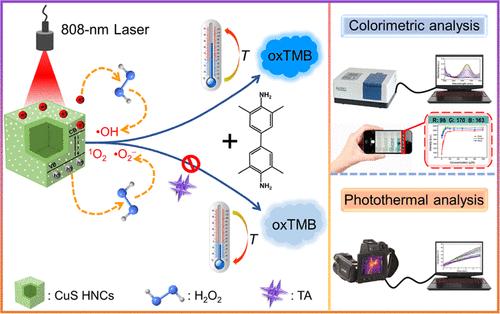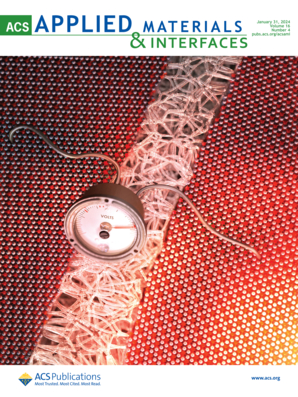Enhanced Peroxidase-like Activity of CuS Hollow Nanocages by Plasmon-Induced Hot Carriers and Photothermal Effect for the Dual-Mode Detection of Tannic Acid
IF 8.3
2区 材料科学
Q1 MATERIALS SCIENCE, MULTIDISCIPLINARY
引用次数: 15
Abstract
High catalytic activity is one of the necessary parameters for nanozymes to substitute for natural enzymes. It remains a great challenge to improve the specific enzyme-like activity of nanozymes as much as possible using the characteristics of nanomaterials for avoiding complexity and introducing additional uncertainties. Here, by combining the peroxidase (POD)-like activity and plasmon properties of CuS hollow nanocages (CuS HNCs), we demonstrate the feasibility of modulating the catalytic activity of nanozymes by the localized surface plasmon resonance (LSPR) effect. Rough surfaces and hollow-cage structures endow CuS HNCs with abundant hot spots to produce strong LSPR in the near-infrared (NIR) region, which makes the CuS HNCs simultaneously generate plentiful high-energy hot carriers and thermal effect to mediate H2O2 cleavage to yield the reactive oxide species (ROS) as well as speed up the reaction, leading to a dramatically enhanced POD-like activity. Based on the light-enhanced catalytic activity and high photothermal efficiency of the reaction system, a dual-mode strategy for detecting tannic acid (TA) is developed and successfully applied to determine the content of TA in different kinds of teas. This work not only provides a novel path for tuning the specific enzyme-like activity of nanomaterials but also shows a perspective for dual-mode sensing based on a photoinduced plasmon-enhanced effect.

等离子体诱导热载流子增强cu中空纳米笼过氧化物酶样活性和单宁酸双模检测的光热效应
高催化活性是纳米酶替代天然酶的必要条件之一。利用纳米材料的特性,尽可能地提高纳米酶的特定类酶活性,避免复杂性和引入额外的不确定性,仍然是一个巨大的挑战。本文通过结合过氧化物酶(POD)样活性和cu空心纳米笼(cu HNCs)的等离子体特性,证明了通过局部表面等离子体共振(LSPR)效应调节纳米酶催化活性的可行性。粗糙的表面和空心笼状结构使CuS HNCs具有丰富的热点,在近红外(NIR)区域产生较强的LSPR,使CuS HNCs同时产生丰富的高能热载子和热效应,介导H2O2裂解生成活性氧(reactive oxide species, ROS),加快反应速度,从而显著增强pod样活性。基于该反应体系的光增强催化活性和高光热效率,建立了单宁酸双模式检测策略,并成功应用于不同茶叶中单宁酸含量的测定。这项工作不仅为调整纳米材料的特定酶样活性提供了新的途径,而且为基于光诱导等离子体增强效应的双模传感提供了前景。
本文章由计算机程序翻译,如有差异,请以英文原文为准。
求助全文
约1分钟内获得全文
求助全文
来源期刊

ACS Applied Materials & Interfaces
工程技术-材料科学:综合
CiteScore
16.00
自引率
6.30%
发文量
4978
审稿时长
1.8 months
期刊介绍:
ACS Applied Materials & Interfaces is a leading interdisciplinary journal that brings together chemists, engineers, physicists, and biologists to explore the development and utilization of newly-discovered materials and interfacial processes for specific applications. Our journal has experienced remarkable growth since its establishment in 2009, both in terms of the number of articles published and the impact of the research showcased. We are proud to foster a truly global community, with the majority of published articles originating from outside the United States, reflecting the rapid growth of applied research worldwide.
 求助内容:
求助内容: 应助结果提醒方式:
应助结果提醒方式:


